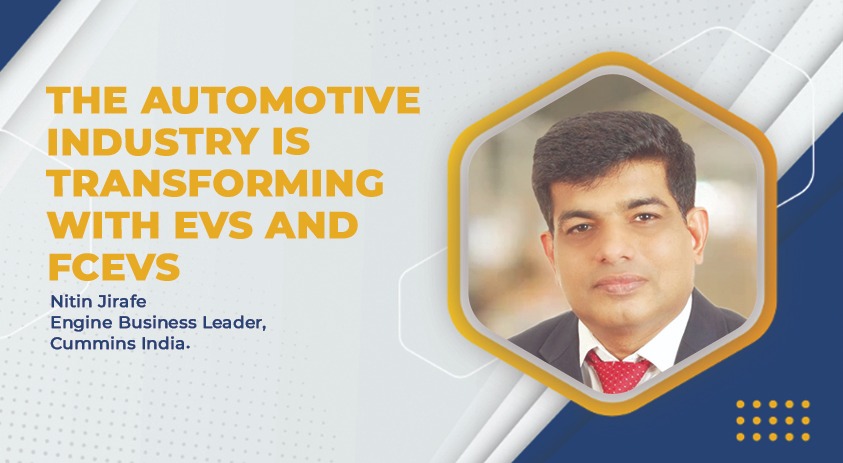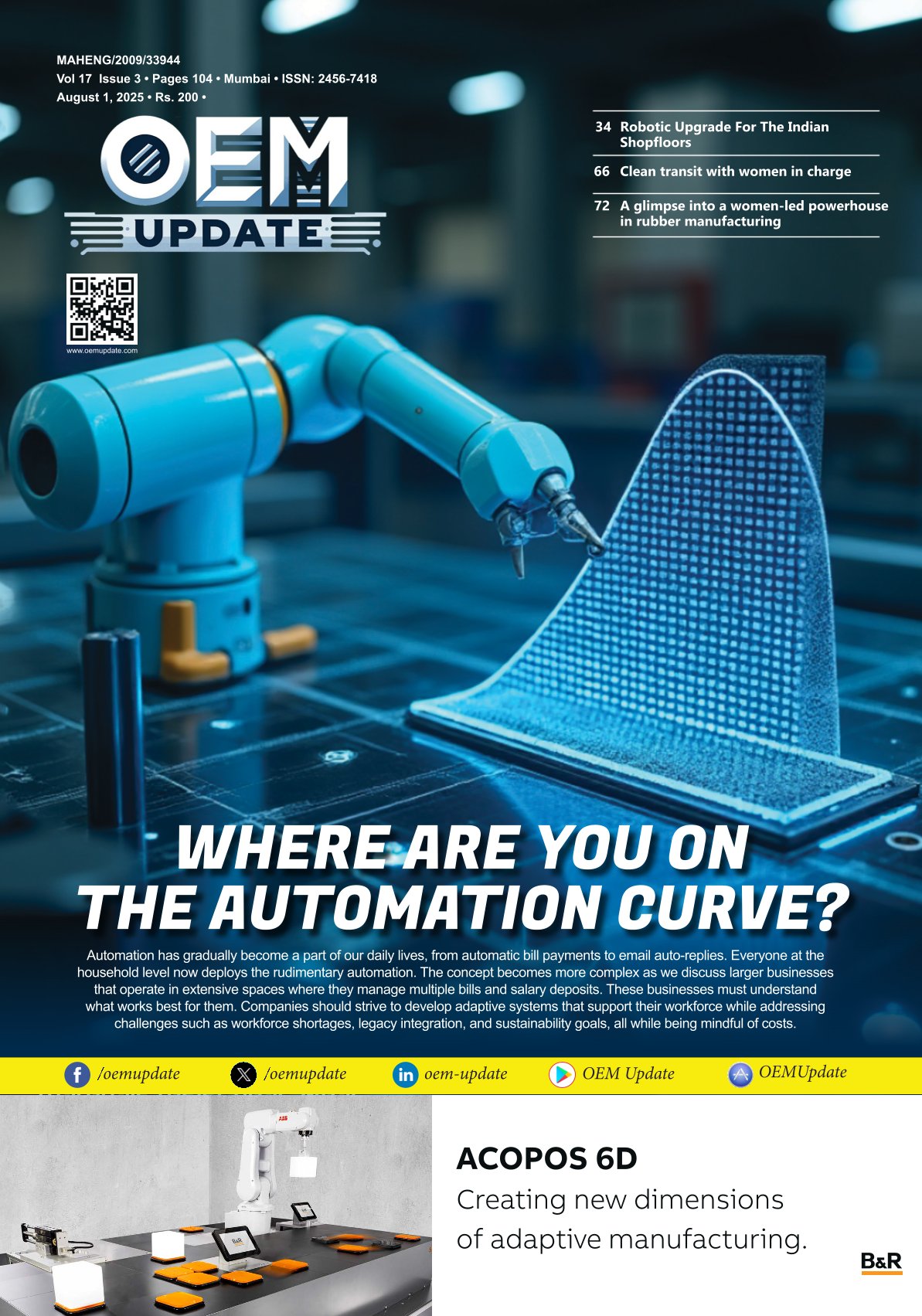The automotive industry is transforming with EVs and FCEVs
By OEM Update Editorial August 2, 2023 3:43 pm IST
Nitin Jirafe, the Engine Business Leader at Cummins India, highlights that the automotive industry has effectively addressed complex challenges by integrating and utilising Industry 4.0 technologies. The automobile industry is poised to navigate towards a more sustainable future by continuously incorporating and leveraging these technologies.
How is the Indian automotive industry adapting to meet the latest safety and emission standards while embracing advancements in electric and hydrogen-powered vehicles?
The Indian automotive industry is experiencing growth on various fronts. Factors such as strong economic growth, a youthful population, and increasing urbanisation are driving volume growth. Simultaneously, the industry is adapting to meet the latest safety and emission standards, aligning with global benchmarks and increasing the value and content of vehicles. The government’s focus on infrastructure projects further fuels the demand in this sector.
Moreover, the automotive industry in India is undergoing a transformative shift propelled by advancements in electric and hydrogen-powered vehicles, technological integration, manufacturing excellence, and research and development. The nation is actively transitioning toward zero-emission mobility, driven by the government’s ambitious goals of reducing vehicular emissions and dependence on fossil fuels. This shift has led to the development of ecosystems for hydrogen-based fuel cells and internal combustion technology, representing the future of mobility.
The industry is leveraging digital technology to enhance vehicle efficiency, safety, and connectivity. Artificial intelligence (AI) and data analytics are being integrated into vehicle systems to enable monitoring and predictive maintenance. India’s commitment to developing world-class manufacturing capabilities has been instrumental in shaping its automotive industry.
By embracing sustainable mobility solutions and driving innovation, the Indian automotive sector is poised to have a significant global impact. This reflects the country’s growing economic strength and its dedication to a greener and technologically advanced future.
How is the industry leveraging 4.0 technologies for sustainability in the automobile industry?
The automotive industry has quickly adopted technological advancements to enhance efficiency and address sustainability concerns. Industry 4.0 encompasses a range of digital technologies that enable automation, connectivity, and intelligent decision-making. These technologies offer valuable tools for the automotive industry to reduce its environmental impact and promote sustainable practices.
These Industry 4.0 technologies, including artificial intelligence (AI), machine learning (ML), and the Internet of Things (IoT), enable the implementation of intelligent manufacturing processes. By leveraging data-driven insights, automotive manufacturers can optimise production efficiency, minimise energy consumption, and reduce waste. By utilising Industry 4.0 technologies, automotive manufacturers can achieve the following:
· Enhance supply chain optimisation, resulting in reduced energy usage and emissions.
· Streamline logistics processes through advanced data analytics and AI algorithms, minimising unnecessary transportation and improving inventory management.
· Real-time insights enable better control over resource utilisation, leading to a decreased environmental impact.
· Connected factories provide end-to-end visibility of the entire supply chain, including product quality and process capability, which support in anticipating issues ahead of time. These are helping to shift the manufacturing and supply chain mindset from reactive to proactive and predictive way of working.
The integration and utilisation of Industry 4.0 technologies have effectively equipped the automotive industry to tackle complex challenges. Integrating and leveraging these technologies will undoubtedly steer the automobile industry towards a more sustainable future.How can software and technology providers leverage the growing demand for electric vehicles?
The electric mobility automobile sector has witnessed substantial growth recently. With the increasing demand for electric vehicles, there are numerous opportunities for software and technology providers to capitalise on this emerging market. One key opportunity lies in the development of advanced charging infrastructure. As more electric vehicles hit the road, efficient and widespread charging stations become crucial. Software and technology providers can seize this opportunity by creating innovative solutions to optimise the charging process, such as smart charging algorithms and real-time monitoring systems. By offering convenient and seamless charging experiences, these providers can promote the adoption of electric vehicles and contribute to the sector’s overall growth.
Furthermore, software and technology providers can focus on developing intelligent energy management systems. Electric vehicles not only require charging but also need efficient management of their energy consumption. By leveraging advanced software and technology, providers can design intelligent systems that optimise energy usage by considering factors like battery capacity, driving patterns, and external conditions. This optimisation can result in extended battery life, improved range, and enhanced overall performance of electric vehicles.
There are ample avenues for innovation and growth in advanced charging infrastructure, intelligent energy management systems, vehicle-to-grid technology, and autonomous capabilities. Software and technology providers, with their expertise and creativity, can play a pivotal role in shaping the future of electric vehicles and contribute to building a sustainable and efficient transportation ecosystem.
How have robotics and 3D printing technologies revolutionised automotive manufacturing?
The automotive industry has rapidly embraced technological advancements, particularly in integrating robotics and 3D printing, which have transformed vehicle design and manufacturing processes. Implementing robotics and automation has significantly enhanced efficiency and productivity, reducing production time, improving accuracy, and enhancing quality control.
3D printing technology has helped streamline the manufacturing process by enabling the rapid development of parts and components. This technology offers numerous advantages, including creating intricate designs, minimising material waste, and producing lightweight yet durable components. Furthermore, 3D printing allows for customisation, facilitating the production of tailor-made parts that cater to individual customer preferences.
Integrating robotics and 3D printing has become essential in the ever-evolving automotive industry, driving innovation, efficiency, and sustainability. As these technologies continue to advance, we can expect further groundbreaking developments that will shape the future of mobility. Additionally, these technologies enable the upskilling of the workforce and offer opportunities for existing employees to move up the value chain.
How do you evaluate Make in India and the Atmanirbhar concept that propagate indigenous manufacturing?
India’s economic landscape has undergone significant transformations with the introduction of initiatives like Make in India and Atmanirbhar. These initiatives aim to promote indigenous manufacturing and self-reliance. The Atmanirbhar concept emphasises the importance of self-reliance and domestic manufacturing with a primary objective to reduce India’s dependence on imports, particularly in strategic sectors, and instead encourage domestic production. This concept gained prominence during the COVID-19 pandemic, which exposed vulnerabilities in global supply chains.
Make in India has attracted foreign direct investment and encouraged multinational corporations to establish manufacturing units. This has created employment opportunities and enhanced technological capabilities and skill development. These initiatives have facilitated the growth of the manufacturing sector, a vital component of economic progress.
The government has introduced Production Linked Incentives (PLI) schemes to support domestic manufacturing for future technologies further. As the Automotive industry takes transformative steps towards zero-emission technologies, the PLI scheme will help build the ecosystem and enable India to become a hub for these future technologies.
The Make in India initiative and the Atmanirbhar concept are crucial to promoting domestic manufacturing and achieving self-sufficiency. Their effectiveness will rely on successful implementation, addressing challenges, and creating a conducive business environment. By evaluating these initiatives and making necessary adjustments, India can strengthen its manufacturing sector, drive economic growth, and achieve long-term sustainability.
Cookie Consent
We use cookies to personalize your experience. By continuing to visit this website you agree to our Terms & Conditions, Privacy Policy and Cookie Policy.












